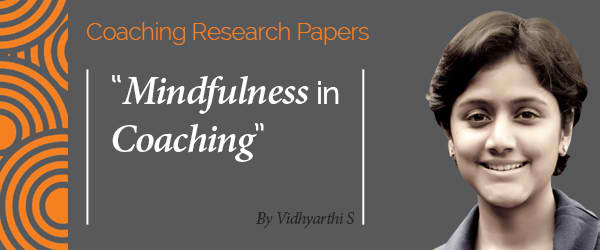 Research Paper By Vidhyarthi S
Research Paper By Vidhyarthi S
(Behavioural Change Coach, INDIA)
Introduction
Every coaching conversation is said to be a mindful conversation between the coach and coachee. The mindfulness aspect in coaching has been described in many subjective ways by those who have experienced it. This paper sets out to explore the importance of mindfulness in a coaching conversation, the benefits of being mindful and the methods by which one can become mindful.
Many a times, good coaches are said to be invisible in a coaching conversation. They tend to have the ability to become one with the coachee and almost mirror the mental maps and images of the coachee. This ability of the coach has helped in numerous situations to create a dance- a dance of insight. There is flow and it appears that the two individuals are not two but just one entity dancing together.
What is mindfulness?
Being mindful has various interpretations including- being in the present, being with the flow, being aware, being thoughtless, being empty in the mind and so forth. All of these interpretations seem to be in one way or the other addressing the concept of mindfulness.
A more detailed definition for mindfulness is extended by modern psychology which explains mindfulness as a psychological quality that involves bringing one’s complete attention to the present experience on a moment-to-moment basis or involves a kind of non-elaborative, nonjudgmental, present-centered awareness in which each thought, feeling, or sensation that arises in the attentional field is acknowledged and accepted as it is.
(Source: Wikipedia
The Role of the mind in creating mindfulness
To understand mindfulness also requires understanding what the mind is. There is nothing tangible about the mind. The mind is actually a metaphor. (Source: Quantum Mind; Arnold Mindell- pages 67 to 75). It has an existence however it cannot be pin pointed in a specific location or time. The mind is described as extensively vast with a number of layers from which it operates.
The outermost layer of the mind is called the conscious mind or the everyday mind. This layer helps in creating a reflexive awareness of the immediate environment and surroundings. The second layer is the unconscious mind which is a lot deeper than the conscious mind. This layer holds within it the memories, emotions, lessons, values and belief systems. This layer predominantly operates from the background. Operating from the background is to say that this layer is always functional.
However the individual is generally unaware of its presence and its functions. Research is still being undertaken to unearth the other layers of the mind. The Hindu scriptures (Bhagwad Gita, Upanishads) have reiterated the “Buddhi” or the intellectual layer as another deeper layer of the mind. A further in-depth layer is the “ego” which is the sense of “I”. To many other scholars, the inner most layer of the mind is the soul which is nothing but energy form that has intertwined within it information about life, its purpose and mission.
With this established understanding of the mind, a relook at the definition of mindfulness helps in creating deeper clarity.
Mindfulness is the ability to integrate and align all the layers of the mind towards the present moment. (Source: Four functions of the mind- Swamij)
A mindful person tends to create awareness of the situation at hand by thwarting thoughts that could detract the mind from the activity in focus. This idea of mindfulness and the possible role of thoughts in creating distractions can be understood by comparing the mind to an ocean. The mind is like a vast ocean. The thoughts that can emerge in the mind are like the waves in the ocean. A still ocean is one which has less turbulent waves. Similarly a still mind is one that has lesser number of thoughts emerging from within.
Being mindful is therefore being complete in one’s mind with the situation at hand.
Benefits of Mindfulness
Having understood what it means to be mindful there are numerous benefits that have been witnessed by many about being mindful. Mindfulness is not a useful ability just in the coaching professions. Many doctors, student, researchers, scholars and trainers and many more have benefited by the ability to be mindful.